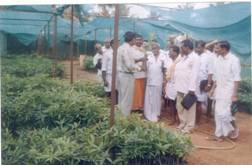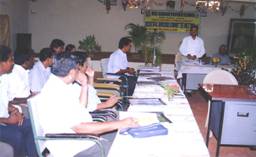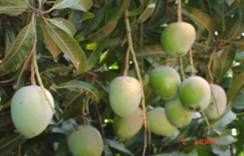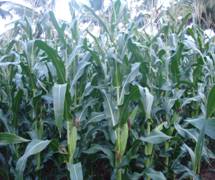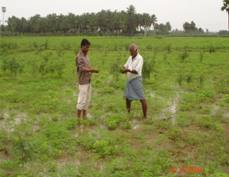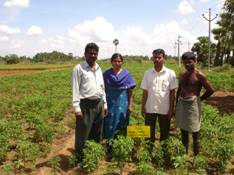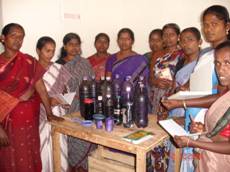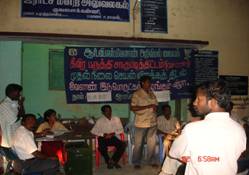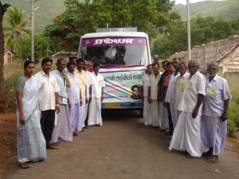 |
|||||||||||||||||||||||
|
|||||||||||||||||||||||
|
Crop Production |
RVS Krishi Vigyan Kendra (RVS-KVK), Tirunelveli District | Weather |
|||||||||||||||||||||
Success Stories: : Agronomy Mr. A. Subramanian ( Age 49 ) is a social worker and a progressive farmer. He owns 5 acre of land at Keelasurandai. His family members are well supporting him in farm and social activities. He is actively gathered the importance of Vermi composting and scope of it from various sources like TNAU information centre, KVK and Agrl. Dept. etc. The knowledge of using cow dung for manuring crops were motivated him to start this enterprises. Then he contacted the KVK and Line Department officials to guide him related to Vermicompost production and vermin wash aspects. They guided him to take training on these aspects at KVK and KVI, (T. Kallupatti ). After taking training from KVK, he made some preparatory work regarding availability of raw materials like cow dung, FYM, Neem leaf and farm waste which are required for Vermi compost production. In the initial stage, he also took training on Vermi composting at KVK. After the proper guidance by KVK, he planned activities to maintain quality standards and some exotic species of earthworms and he executes them. He made initial investment of Rs. 25,000/-. He used his own raw materials for composting. He and his family members were engaged themselves in Vermi compost production. They used to get around 500-600 kgs of Vermi compost for every month and sold the produce at neighboring places. The major break through had happened to this enterprise when the farmer who happened to be a member of Ban on Cow slaughtering committee which had recommended the temple authorities to hand over the milch animals to Mr. Subramani. In turn, he had taken 25 animals on lease basis. His wife is also a SHG Animator. She is a progressive social worker, he took milch animals from temple authorities and allotted 3 milch to each SHG members, total of 54 milch animals. The fodder waste and animal wastes are used for Vermi composting. He purchase these Diary waste from Self Help Group of Irrattaikulam village. He made additional investment of 2 lakhs to expand the enterprise to collect FYM from outside sources. Monthly requirement of FYM is 5 tonnes. Out of which 2 tonnes were purchased from outside. From this he collect 2-3 tonnes of vermicompost for every month. This compost are sold in Kovilpatti, Tirunelveli and Srivaikundam. He also sold through SHG Daily market, which is run by DRDA, at Tirunelveli. Through this he earned Rs. 15,000 to 20,000 / month. He engaged all his family members (4 no’s) and also hired labours from out side. Now he also produce vermi wash, to the tune of 100-150 litres per month. Now he is a owning 6 acres of land and submitted proposal for financial assistance from NABARD for construction of well equipped compost and packing yard which should be free inorganic waste. Faculty : Horticulture Success story - 1 In Tirunelveli District, there is a wide scope in the promotion of fruit crops because the acreage under waste land is more when compared to other districts. So there is always a demand for seedlings of elite varieties in our district. Mr. Subramanian, an interested farmer wants to start a new nursery so that he can become an entrepreneur. He seeks the help of our KVK. Our KVK gave all sorts of technical guidance about the nursery management by giving skill training to him. He also trained in doing the grafting works and purchase of materials to raise a new nursery. Then he started a new nursery in the name “Mani Nursery Garden” on Coutrallam road. He had also put a sales point at Courtallam. Initially he purchases the plants from outside and sold it as second sales. After attaining good experience and guidance from us, he is producing the plants his own land. He had also developed elite mother plants from his own field under the guidance of RVS KVK. He is producing the grafts like Mango, Guava, Sapota, Amla, Lime, Cashew and also ornamentals. He is producing a worth of around 4 lakh rupees of plants every year and gets a good income from this new venture. More over, he employed 7 workers particularly for the production and maintenance of plants. Now he cleared all the loans and debts that he got and also purchased newly 2 acres of land near Courtrallam. We were rendering a continuous support for his sustainable growth. Success story – 2 Our SHG group named Vasantham seeks the help of our KVK to start an entrepreneurship in horticulture. The group consists of 20 members. They obtained loan from the bank and started rose cultivation. They also started to produce seedlings of Neem, Tamarind and other Agro plants. In rose, our KVK gave all sorts of technical guidance about the production practices in rose. For yield improvement we put an OFT and by which there is an significant increase in the yield. They are also trained in the preparation of Panchakavya and Vermi compost. By this, the cost of cultivation was very much reduced. By the foliar application of Nutrients, they are getting more number of flowers in a single plant. In addition to this, they are selling 10,000 nos of Neem, Tamarind, Casuarina and Teak plant at reasonable prices. Success story - 3 In many areas of Tirunelveli district, the farmers planted the country varieties in Amla. The fruits from this tree was very small and having less market value. So there is a need to change the old country varieties in to high yielding varieties due to the increased demand for Amla with out uprooting the older trees. A farmer Mr. Jayachandran from Kadayam is having 5 acres of Amla which is full of local varieties and the yield from the tree was very less. He seeks the help of our KVK. In the previous year we alter the local varieties in to an elite varieties by top working techniques. This may be done by cutting the trees at 1 metre height and encourage 7 to 10 sprouts. The scions of high yielding varieties were grafted on the sprouted stems at pencil thickness stage. At the first instance, we did the top working in his field for 100 trees and later extended to all the trees. Now from 250 trees he is getting a minimum income of Rs. 2.0 lakhs. The trees are yielding from 40 kg to 60 kg per year. Now, he is extended the planted of Amla in his field and alter the old varieties by top working. This technology has been disseminated to the near by areas and we were altered about 23 number of farmers field containing local varieties in Amla. Success story – 4 Production of good quality grafts has always a good demand inTirunelveli District owing to its larger acreage. But the graft men availability is very scarce. So for the purpose of production, Horticultural farms generally hire the trained persons from Salem and Periyakulam. Mr.S.Chandran who was only an Agricultural labour approached us and asked whether he will be able to become a skilled labour. He is getting a labour wages of Rs.50 / day. Our RVS KVK trained him on grafting techniques for a period of six months. Now he become an expert in doing grafting, layering and budding. At present he is working in a farm with a monthly salary of Rs.2500 per month with all leave facilities. Moreover as a part time job, he goes on contract work for grafting and gets Rs. 0.60 to 0.75 per graft. Faculty : Animal Science Success story – 1 Mr. N. Abdullah aged 41 residing at Kadayanallur of Tirunelveli district of Tamilnadu. He has completed H.Sc., at during 1981. He was an unemployed and he contacted KVK, Tirunelveli. He was advised to get training on self employment opportunities during 2004. He has also attented one training on Rabbit rearing on June 2004 and he got interest on the same. Again he was also advised to undergo training on Rabbit rearing during 2nd January to 09th January 2005. He planned to rear the rabbit by cage system and purchased the cage at about Rs. 15,000. He also purchased feeder and waterer from Salem at the cost of 1000 rupees. He is selling 5 units (50 animals in a year) at the wait of 2.2 kg . The cost of each broiler rabbit is Rupees 300. The rearing cost is rupees 75 per animal. So he is getting gain at about 225 rupees per animal with in a period of 6th months. He also making money from litter materials as manure to the people who are having agriculture land. Faculty : Home Science Success story - 1 Success story – 2 Ulagamman SHG of Ayikudi has initially started the income generating activity of Murukku making with an investment of Rs. 10,000 on infrastructural facilities. Initially the group comprised of 15 women, due to some internal problems the no. of partners ended in 5. Because of some technical lack ness and incomplete knowledge on marketing feasibilities the 5 of SHG met RVS-KVK, Technical staff for advisory service. With the guidance provided by RVS- KVK technical staff they improved their activity in a good manner and now they are able to generate a monthly profit of Rs. 2,000 beyond earning an amount Rs. 100 / day / member. Success story – 3 “Annai” Self Help Group was organized at Kallambuli Village in 2000 by RVS- KVK technical staff. SHG members told our technical staff that they have to walk a long distance to buy their necessary commodities even in their village had around 380 families there is no Ration shop. The needed guidance and help to start a ration shop of their own in their village. Our technical staff made arrangement immediately to get loan to Indian bank and an amount of Rs. 60,000 was got as loan from IB for this run by self Help Group and with that amount they have started ration shop in 2002 and it is running in a good manner. With this profit they had repayed more than 75% loan amount.By this way the SHG is beneficial to the whole village. Success story – 4 Mrs. Velduraichi approached RVS KVK with her husband Mr. Sakthivel. She asked if there is any possibility to get loan individually from bank. We assisted her to get loan one has to form an SHG group with 20 members and start group savings as per the norms. After the completion of six month that group will be eligible for getting loan. After 10 days she formed a SHG in her village with 19 members and informed our scientist about it. Then we linked the group in Pandiyan Grama Bank titled “DEVI” dated on 05.05.2003. We organised a group meeting and explained about the group norms, functions, importance and SHG maintenance. Then they started their savings. At the end of the sixth month, rating of the group was done on the basis of performance (i.e based on records maintenance). Based on the rating, the group was provided with a loan of Rs. 30,000 /- by PGB for their own development. She also increased her family income with this share amount by preparing pickles and candy. Then we suggested to take training on value added products made from fruits through our KVK. We gave training on variety of pickles and amla candy making. After the completion of training programme, she make use of her own farm produces and started to prepare pickle ( Amla, Mango, Tomato ) and Candy. Then she made rapport with village retail shop owners to market their produce. Now she can earn Rs. 40/day Plant Protection Paddy is the important crop grown in Tirunelveli district. Villages adjoining Surandai in Tirunelveli district grow paddy in an extensive scale. Farmers in this area are using more than 3 rounds of spray of pesticides to control various pests and disease in Paddy. During the field visits made in this area our KVK scientist repeatedly emphasized the use of IPM in Paddy. Then based on need and interest, of the farmers in this area our KVK scientist organized On and Off campus trainings to farmers on IPM in Paddy. In these trainings, our scientist stressed the use of T.Chilonis, simple light traps, Bird perches and use of Neem oil instead of using chemical pestiticides alone. Among the farmers trained one farmer by name Ayothi George in Surandai implemented the IPM tools in his paddy crop based on the guidelines given by our KVK scientist. Earlier the farmer indiscriminately used insecticides like Rogor, Monocrotophos, Endosulfan for the control of insect pests i.e. on noticing insect pests mostly he started spraying (15 DAP) and then gave successive sprays at 15 days intervals from the previous sprays. In between if he noticed any symptoms of Leaf spot he has used Copper oxy chloride for control of leaf spot. Mostly he gave 2 sprays of each of the chemicals mentioned above in alternate sprays. On the contrary we guided him to use T.chilonis at the rate of 5cc/ha/release on 37, 44&51 days after transplanting for the control of leaf folder. Our KVK scientist also advised him to use Simple light trap (@1/5 acre area), Bird perches (5/ha), recommended dose of ‘N’ fertilizer & Neem oil 2 %spray. For IPM method the farmer invested Rs.1060/ha as against Rs.2340 he invested in the chemical control method, which he adopted earlier. He also obtained an increased yield of 0.175 t/ha (3875 kg/ha instead of 3700kg) apart from environmental safety One day a progressive woman from Tirunelveli District was came to our KVK. She was landless and she was interested in Mushroom Cultivation. We taught that woman about Mushroom Cultivation, pest & disease management, and marketing. Her story is success story of a self-made, hark working diligent woman who has overcome several problems in life. Among the different agro based activities that she has tried, the most profitable Mushroom Cultivation. Initially she invests only Rs.1500 for establishment of Mushroom unit with good support from our KVK scientist. She was established 10 bed per harvest from that. She was harvested 4 kg/bed. Totally she was harvested 40 kg in a unit. She sold 1 kg of mushroom at the rate of Rs.70 per kgs. She was earned Rs.1300 profit from the small mushroom unit. Further our scientist provided mushroom processing technology to that poor woman with our Technology support. The poor woman was turn into a successful small entrepreneur in Tirunelveli district.
|
|||||||||||||||||||||||
Special Technologies |
|||||||||||||||||||||||
 |
|||||||||||||||||||||||
Home | About Us | Success Stories | Farmers' Association | Farmers' Innovation | Publications | FAQs | Contact
© 2013 TNAU. All Rights Reserved. |
|||||||||||||||||||||||
